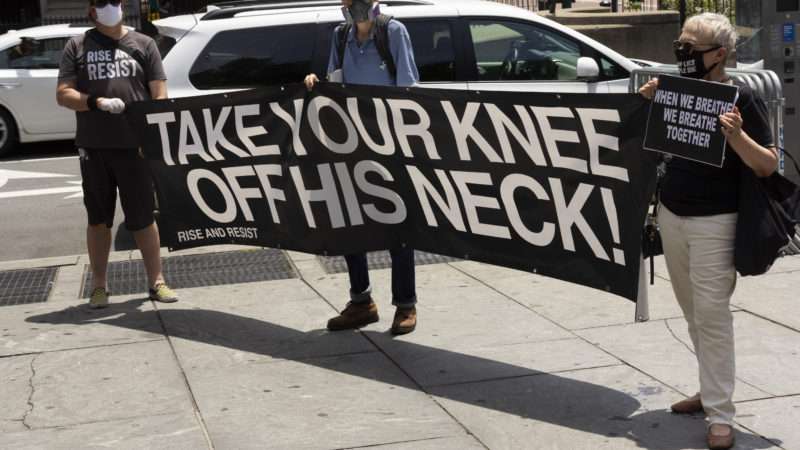
You might have noticed that there’s a lot of criminal justice news right now. In fact, it can be downright overwhelming to keep track of what’s going on at the local, state, and federal levels. Here’s a quick roundup of some of the most significant policing reforms that passed (or failed) over the last week.
Congress
- Last night the Democrat-led House passed the George Floyd Justice in Policing Act by a largely party-line vote. The bill would end qualified immunity—a legal doctrine that shields cops from liability in civil rights lawsuits—establish a national registry for police misconduct, ban police chokeholds and no-knock raids in some circumstances, and limit the transfer of military equipment to state and local police departments. It would also require federal law enforcement officers to wear body cameras and to have dashboard cameras installed in their vehicles. However, Republicans and the White House say ending qualified immunity is a deal-breaker.
- Senate Republicans’ more modest policing reform bill, the JUSTICE Act, introduced by Sen. Tim Scott (R–S.C.), is dead in the water after Democrats blocked debate on it. Democrats and civil liberties groups oppose the bill, saying it doesn’t go nearly far enough to address systemic problems in American policing. Republicans say the bill strikes a balance between addressing needed reforms and supporting police as an institution.
- Sen. Mike Braun (R–Ind.), bucking the rest of his party, introduced the Reforming Qualified Immunity Act, which would not end the legal doctrine of qualified immunity, but it would come close.
- Sen. Rand Paul (R-Ky.) reintroduced the FAIR Act today, which would significantly reform federal civil asset forfeiture.
State-level Package Bills
- Colorado Gov. Jared Polis signed a sweeping police reform bill into law. The new laws will, among other provisions, require officers to wear body cameras and record police-initiated interactions with the public; create a database of police use-of-force incidents; forbid officers from firing less-than-lethal projectiles at someone’s head, pelvis, or back, and bars cops from firing indiscriminately into crowds; and strip police officers of qualified immunity in civil court if they are sued for violating people’s rights or for failing to intervene when they witness another officer violating a person’s rights.
- Police reform legislation collapsed in the Minnesota legislature amid a partisan standoff between the Democrat-led House and Republican-led Senate, and lawmakers left the special session with nothing to show for their work. Republican senate majority leader Paul Gazelka told reporters the legislature is “weeks and weeks away from the possibility of doing something with criminal justice reform.”
- Hopes of police reform also look dim in Georgia, where Democrats have introduced bills that would restrict police use of tear gas, tasers, and choke holds. Georgia House Republicans, meanwhile, passed a bill that would have made police officers a protected class under a new hate crime law. That provision was stripped from the state senate’s version of the legislation.
Use-of-Force
- Utah Gov. Gary Herbert signed a bill into law on Thursday that makes it a third-degree felony for a police officer to kneel on a suspect’s neck as a method of restraint and a first-degree felony if that action resulted in a person’s death.
- The Louisiana House unanimously passed a bill to study policing tactics statewide, but not before removing a reference to George Floyd.
- The Memphis Police Department announced it will no longer execute no-knock search warrants following the March death of Breonna Taylor in botched no-knock SWAT raid.
- The Omaha Police Department updated its use-of-force policies to prohibit officers from using their knees to pin someone’s neck to the ground.
- In New York City, an NYPD officer was arrested for using a banned chokehold, the first cop to be prosecuted under a new law prohibiting chokeholds.
Surveillance
- The Boston City Council unanimously passed an ordinance banning the city government from using facial recognition technology.
- Santa Cruz, California, banned the use of predictive policing tools.
Transparency
- The New York City Council passed the POST Act, which will require the NYPD to disclose all of the surveillance technology that it uses on the public.
- Atlanta Mayor Keisha Lance Bottoms signed an executive order requiring the police department to identify ways to improve compliance with body camera policies and responsiveness to public records requests for body cam footage, as well as provide a way for the public to submit recordings of police use-of-force incidents for investigations. The order also calls for strengthening the Atlanta Citizen Review Board.
School Policing
As Reason reported yesterday, school districts around the country are considering ending their contracts with local police departments.
- The San Francisco Unified School District Board of Education unanimously approved a resolution to end its memorandum of understanding with the San Francisco Police Department.
- The Oakland school board also voted unanimously on Wednesday to eliminate the district’s police department and shift its $2.5 million budget to student support services.
- The Chicago Board of Education rejected a proposal, supported by teachers unions, to terminate its $33 million contract with the Chicago Police Department. Chicago Mayor Lori Lightfoot opposed the proposal, but it was still only narrowly defeated by a 4-3 vote.
- The Los Angeles Unified School District also voted down three separate proposals to address the use of SROs, including one that would have slashed the school police budget by 90 percent, after an 11-hour marathon session.
- School police officers in Philadelphia will be renamed “school safety officers” and wear new, less severe uniforms when school (hypothetically) resumes in September.
Police Unions
- A labor coalition in Seattle, Washington, voted to expel the city’s police union.
from Latest – Reason.com https://ift.tt/2CKHY1S
via IFTTT